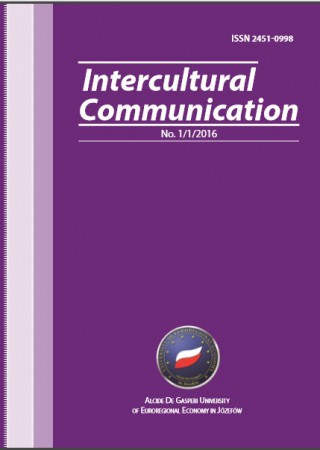Intercultural Communication
Intercultural Communication
Publishing House: Wydawnictwo Akademii Nauk Stosowanych WSGE im. A. De Gasperi w Józefowie
Subject(s): Politics / Political Sciences, History, Philosophy, Social Sciences, Language and Literature Studies, Law, Constitution, Jurisprudence, Theology and Religion
Frequency: 2 issues
Print ISSN: 2451-0998
Online-ISSN: 2543-7461
Status: Ceased Publication
- 2016
- 2017
- 2018
- 2019
- Issue No. 1/1
- Issue No. 2/1
- Issue No. 3/2
- Issue No. 4/1
- Issue No. 5/2
- Issue No. 6/1
Articles list
{{ article.TitleOriginalLanguage }}
{{ article.TitleOriginalLanguage }}
({{ article.TitleEnglish }})
- Publication: {{ article.Publisher }} ({{ article.Issue }})
- Author(s): {{ article.Authors }}
- Contributor(s): {{ article.Contributors }}
- Language: {{ article.Language }}
- Subject(s): {{ article.Subjects }}
- Issue: {{ article.Issue }}
- Page Range: {{ article.PageRange }}
- No. of Pages: {{ article.NumberOfPages }}
- Keywords: {{ article.Keywords }}
- Summary/Abstract: {{ article.SummaryAbstract }}
- Price: {{ common.currency(article.Price) }}
Short Description
The purpose of the journal, in the current increasing globalization and the intensification of migration, is to provide an effective platform for the international exchange of fundamental and applied experience in the field of intercultural communication in the areas of social sciences and humanities (cultural anthropology, sociology, philosophy, philology, history, science on safety, media studies, political science, management science, legal science, pedagogy, psychology, religious studies, etc.).
In the journal, we publish research results, based on:
- the classical meaning of the term "intercultural communication" – the international, inter-nation, inter-ethnic communication,
- the functional meaning of the term "intercultural communication" – the communication between the various systems of norms of behaviour, the moral norms, the values, the lifestyles, the customs etc. of various social groups (for example: the urban culture, the generations culture, the organization cultural etc.).

